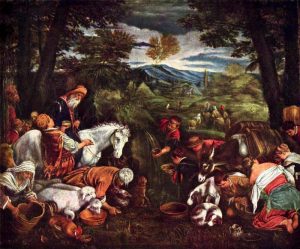Thoughts on Sunday’s Lessons for Sept. 27, 2020
First Reading (Track One): Exodus 17:1-7
The people in their journey through the desert continue their complaints in our Track One first reading. They quarrel with Moses and doubt whether God is really watching over them.

Moses Striking the Rock and Bringing Forth the Water (late 16th century), painting by Jacopo Bassano (c.1518-1592). Musée du Louvre, Paris. (Click image to enlarge.)
In last week’s reading we saw God respond to their hunger with daily rations of quail and manna. But now they have no water, and even if their whining seems to annoy Moses, it’s hard to blame them for grumbling about their thirst. God instructs Moses to go ahead with some of the elders, where he is to strike a rock with the rod that he had used to part the Red Sea’s waters. Moses complies, and when he hits the rock, water comes gushing out to slake everyone’s thirst.
First Reading (Track Two): Ezekiel 18:1-4, 25-32
We return to the Prophet Ezekiel, whose prophecy we heard just a month ago, for another lesson from earlier in the book. On Aug. 31 we heard the prophet warning the people that, although God does not want to kill them, they surely must die if they do not repent and turn back from their wicked ways. In Sunday’s Track Two first reading we hear a similar, longer exhortation, another stern warning that contains within it a glimpse of hope. Again Ezekiel sees repentance as the necessary response to a dangerous pattern of behavior: Fail in righteousness, refuse to be just, and you must die. But repent, turn away from wickedness, and enjoy life in the grace of God, who takes no pleasure in your death or that of your children. “Turn, then, and live.”
Psalm (Track One): Psalm 78:1-4, 12-16
Writing centuries after the ancestral story of the people’s exodus from Egypt and their journey through the wilderness to freedom, the Psalmist joyfully recalls that narrative with no hint of the quarrelsome, complaining times when the people forgot God’s blessings. In this hymn of praise that “declares the mysteries of ancient times,” these verses echo to future generations how God’s power and marvels opened the sea, led the people toward freedom, and, indeed, brought water gushing out of a cliff like a river.
Psalm (Track Two): Psalm 25:1-8
The five or six Psalms that follow immediately after the beloved 23rd Psalm also sing praise and gratitude to a loving God who cares for us and protects us from our enemies. When we sing this Psalm we echo the ideas that Ezekiel expressed: We remember that, though we may have sinned and transgressed God’s love and hopes for us, we nevertheless trust in our loving, saving God to remember us with compassion, protect us, and guide us toward right paths in spite of our errors.
Second Reading: Philippians 2:1-13
Now we hear more of Paul’s beautiful letter to his dear friends, the Philippians, written from his prison cell in Rome. Be encouraged and consoled by the life and love of Christ, he exhorts them. Be as humble and unselfish as Jesus, placing the needs of others before our own ambition; and in doing so, live as Jesus lived. Then he turns to the poetic phrases of one of the oldest hymns of the early church, proclaiming that Jesus – although made in the form of God – “emptied himself” in utter humility, taking instead the form of a slave, obediently accepting death by crucifixion; and in so doing became exalted as our anointed Lord and master.
Gospel: Matthew 21:23-32
We have skipped over several chapters and a great deal of activity since last week’s Gospel. Jesus and his disciples have reached Jerusalem, entered the city with palm-waving, cheering crowds, and angrily thrown over the money changers’ tables in the temple. Now it is a new day, Jesus has come back to the temple, and the wary high priests try to trap him by asking with whose authority he teaches, heals and speaks. But Jesus traps them back with his own trick question about John the Baptist that they can’t answer either way without getting into trouble. Then Jesus moves on to a parable that, as parables do, asks a thought-provoking question: Is it better to walk the walk or talk the talk?
